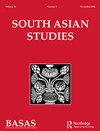Riverfront Gardens and City Walls of Mughal Agra: A Study of Their Locations, Extent and Subsequent Transformations Using Remote Sensing and GIS
IF 0.7
0 ASIAN STUDIES
引用次数: 6
Abstract
Analysing old maps and correlating patterns with remote sensing (RS) images have been a useful technique for identifying features of cultural heritage. The present work has conducted a geospatial analysis of Mughal Agra by comparing historical maps and satellite imagery. This paper make two distinct contributions: (1) it expands existing findings on the riverfront Mughal city by identifying the position and footprint of all the riverfront complexes (by complex we mean property that have or had Mughal mansions, gardens or tombs) marked in a Mughal map of 1720, and (2) it makes original contribution by delineating the two-tiers of city walls and further attempts to comprehend the spatial transformations of the city since the Mughal period. This exploration resulted in recognizing traces of many lost historical built forms like city walls, gateways and riverfront complexes those of which have transformed, integrated, camouflaged or sometimes lost within the urban fabric of the present city of Agra.阿格拉的滨河花园和城墙:利用遥感和GIS研究它们的位置、范围和随后的变化
分析旧地图并将模式与遥感图像相关联是识别文化遗产特征的一种有用技术。目前的工作是通过比较历史地图和卫星图像对莫卧儿阿格拉进行地理空间分析。本文做出了两个不同的贡献:(1)通过确定1720年莫卧儿地图上标记的所有滨河建筑群(这里的建筑群指的是拥有或曾经拥有莫卧儿豪宅、花园或坟墓的财产)的位置和足迹,扩展了对滨河莫卧儿城市的现有发现;(2)通过描绘两层城墙并进一步尝试理解自莫卧儿时期以来城市的空间变化,做出了原创性贡献。这次探索发现了许多失落的历史建筑形式的痕迹,如城墙、城门和河边建筑群,这些建筑形式在现在的阿格拉城市结构中被改造、整合、伪装或有时消失了。
本文章由计算机程序翻译,如有差异,请以英文原文为准。
求助全文
约1分钟内获得全文
求助全文

 求助内容:
求助内容: 应助结果提醒方式:
应助结果提醒方式:


